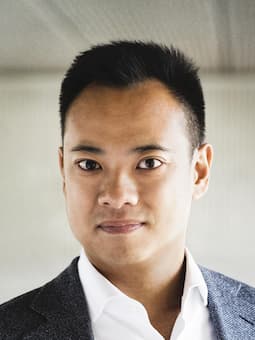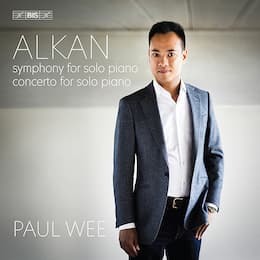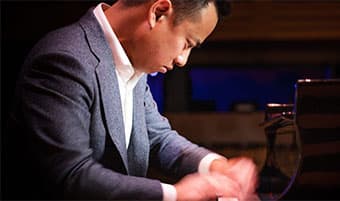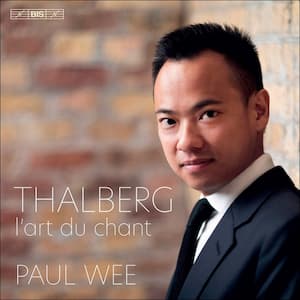“I revel in every opportunity that I have to sit down at the keyboard”

Paul Wee
Paul C.K. Wee, an Australian with Singaporean-Malaysian heritage, is a London-based barrister, and also a concert pianist. He took up the piano as a young child, made his Royal Albert Hall debut at the age of 12, and studied in New York City at the Pre-College division of the Manhattan School of Music under the tutelage of Nina Svetlanova. At 18 he made the decision to study law at Oxford University rather than continue his musical studies in New York. But the piano has remained a very significant part of his life. He has released two recordings, to wide acclaim, and he continues to perform, when his schedule permits, as a recital soloist, concerto soloist, and chamber musician, both in his current home city of London and internationally.
In this interview, he reveals his influences and inspirations, how he balances his professional career with practicing the piano, and what drew him to record Sigismond Thalberg’s l’Art du chant…
Who or what inspired you to take up the piano?
My brother, who had just started playing the piano at about the age of 6. I was around 4 years old myself, and at that age I wanted to do everything my brother did. So I started on the Suzuki method. Neither of my parents had a musical background, but my father has always been a music lover, and I have many childhood memories of hearing Rubinstein and Ashkenazy playing Chopin, Gould playing Bach, and Pollini playing Beethoven through his stereo system. The tipping point for me came one day when I was listening to a CD of Rubinstein playing Chopin – I must have been 9 or 10 at the time – and something clicked. I knew then and there that rather than just playing what my teacher had assigned to me, I had to learn to play those works for myself, whatever it took and however difficult they may be. That was the real start of my musical journey, which ever since then has been principally self-motivated. Probably much to the frustration of some of my teachers over the years!

© Naxos
Who or what have been the most significant influences on your musical life?
I think I have been most influenced by those artists who first opened my eyes to the sheer breadth of colours and sounds that a piano can produce: to name just three, the likes of Ignaz Friedman, Vladimir Horowitz, and Sergio Fiorentino, who could each shade a chord, bend a phrase, or sculpt a line in such a way as to set a sunset in a cadence or a lifetime in a pause – all in ways that go far beyond the mere notes that are printed on the page.
As to repertoire, I have definitely been influenced by those who have looked beyond the four corners of the standard repertoire, and brought numerous neglected gems and treasure to broader attention. Marc-André Hamelin is a real hero of mine in this respect.
As to interpretation, I am strongly convinced by the legal philosopher Ronald Dworkin’s theory of creative interpretation, which provides the descriptive and normative framework that I use to approach questions of interpretation as a musician.
Finally, as to my musical life today, I have to credit three people in particular: Nina Svetlanova, for giving me the pianistic and technical foundations for my relationship with the piano today; Mike Spring, for being the driving force behind my first Alkan recording and ever willing to talk pianists and pianism over a beer; and Robert von Bahr of BIS, for being willing to take a punt on the improbable proposition of a barrister playing Alkan and Thalberg, and for being both the most supportive partner and the dearest friend that any musician could hope to find.
Charles-Valentin Alkan: 12 Études dans les tons mineurs, Op. 39 – No. 8. Concerto I: Allegro assai (Paul Wee, piano)
Which particular works/composers do you think you play best?

© Paul Wee
When I play for myself, I often turn to Bach and Schubert for the deepest fulfilment, whether in the original or in transcription. But that is very different from saying I think I play those composers best, or that others would agree. I know audiences have responded particularly well to my performances and interpretations of Alkan, both live and in the studio. But I firmly believe that my interpretations of other works and composers, both within and outside the standard repertoire, are just as compelling and persuasive. Over time, it will be interesting to see whether audiences agree!
What do you do off stage that provides inspiration on stage or in the recording studio?
I think my honest answer to this probably has to be – either being a barrister by day, or simply not being a full-time professional musician. That’s because music is my escape, not my day-to-day existence. I revel in every opportunity that I have to sit down at the keyboard, and this means that my relationship with music is constantly refreshing and reinvigorating – it is one hundred percent pure delight. I know my love for music wouldn’t have been any lesser if I had become a full-time professional pianist, but if I were reliant on performing or playing week in and week out to put a roof over my head, I wonder whether I might have sometimes felt fenced in or suffocated by the very music that I had set out to enjoy. That is why I have the utmost respect for full-time professional musicians whose conviction and passion for music remains undimmed. I know there is more than enough fulfilment to be found within music to make up for all the sacrifices that a musician’s life entails. But I am also very glad to approach music and the piano from another angle, in which merely making music and playing the piano in the first place gives me all the joy and inspiration I could ever need, for stage or studio or beyond.
Your latest CD is Thalberg’s l’Art du chant. What initially attracted you to this repertoire?
 I first learned of the existence of L’art du chant as a teenager, at around the same time as I was first exposed to the much flashier operatic paraphrases for which Thalberg was and is much better known. While I was greatly taken by the ingenuity and hyper-virtuosity of the pianism in the Moses and Don Pasquale paraphrases, I was also fascinated by the prospect of this set of transcriptions with a very different purpose – the cultivation of a singing tone. Some years later, I managed to obtain the scores for some of these transactions, and discovered to my delight that they were every bit as stunning and well-crafted as I had hoped. Thalberg had clearly taken his mission statement very seriously, and the level of craftsmanship and care that he had put into these transactions to capture the illusion of a singing line can be seen in the extraordinary level of detail captured in the notation. But for some reason, L’art du chant still remained largely neglected, and no recording of the entire set was widely available. It therefore sat on my “wish list” of projects for many years, and so when the opportunity arose to consider possible follow-ups to my debut Alkan recording on BIS, I leapt at the chance to suggest L’art du chant – not only for all of the reasons I’ve just mentioned, but also because of the very different challenge that it posed to the Alkan.
I first learned of the existence of L’art du chant as a teenager, at around the same time as I was first exposed to the much flashier operatic paraphrases for which Thalberg was and is much better known. While I was greatly taken by the ingenuity and hyper-virtuosity of the pianism in the Moses and Don Pasquale paraphrases, I was also fascinated by the prospect of this set of transcriptions with a very different purpose – the cultivation of a singing tone. Some years later, I managed to obtain the scores for some of these transactions, and discovered to my delight that they were every bit as stunning and well-crafted as I had hoped. Thalberg had clearly taken his mission statement very seriously, and the level of craftsmanship and care that he had put into these transactions to capture the illusion of a singing line can be seen in the extraordinary level of detail captured in the notation. But for some reason, L’art du chant still remained largely neglected, and no recording of the entire set was widely available. It therefore sat on my “wish list” of projects for many years, and so when the opportunity arose to consider possible follow-ups to my debut Alkan recording on BIS, I leapt at the chance to suggest L’art du chant – not only for all of the reasons I’ve just mentioned, but also because of the very different challenge that it posed to the Alkan.
Sigismond Thalberg: L’art du chant appliqué au piano, Op. 70 – No. 5a. Lacrimosa (from Mozart’s Requiem) (Paul Wee, piano)
And what have been the particular pleasures and challenges of working on it and recording it?
The principal challenge lay in achieving the musical and aural results that I was striving for in these transcriptions, knowing that I was asking listeners to consider works they may already know in their original vocal forms, and experience them afresh through the lens of the piano. These transcriptions are all about creating the illusion of a singing line on the piano, which is a percussion instrument after all. And while Thalberg’s ingenuity and craftsmanship provide you with many of the ingredients to create that illusion, it is quite another thing to bring it to life, especially given the differences between the modern Steinway concert grand and the pianos that Thalberg would have had in mind when writing L’art du chant. The emphasis on power and projection that has driven much of the evolution of the modern piano – whether manifesting in the deeper and heavier actions, the far lengthier sustains, or the much weightier bass registers of modern instruments – poses many riddles for a pianist grappling with the subtleties of soundwork that these transcriptions require. And all that is on top of the difficulties of the pianism itself in L’art du chant, which – unusually for Thalberg – is far more difficult to play than it sounds!
But if those were some of the challenges, they were more than outweighed by the pleasures. First and foremost was the joy of revelling in these wonderful transcriptions, which really are gorgeous pianistic settings of the most beautiful melodies – even my wife confessed that she didn’t mind listening to me practicing them! At the recording sessions themselves, it was a delight to work with the dream team of Andrew Keener, my producer, and Dave Hinitt, my sound engineer, as well as Kait Farbon, my piano technician extraordinaire – all in the loveliest setting at Wyastone. Another enormous pleasure was making the recording on the most wonderful Steinway from Ulrich Gerhartz’s C&A fleet in London, which was the perfect partner for this repertoire, with all of the best attributes of the modern piano for this type of music and then some. And finally, there was the quieter satisfaction of doing my part to try to bring L’art du chant to a wider audience.
In your working life you are a barrister. How do you balance your professional life with the need to practice, learn new repertoire and maintain your existing repertoire and technique?
With difficulty, but through discipline. I am a barrister first and foremost, and a career at the London Commercial Bar is demanding. My clients know that I give my cases all of the time and attention that they require, and this frequently means that I have to go for weeks without sitting down at a piano. I am very fortunate in that my technique doesn’t require much by way of maintenance and upkeep, and when I sit down at the piano after an extended break away, I can generally pick up from where I left off with no real loss of facility. That stems from the foundations that I built with my last teacher, Nina Svetlanova, who helped me to understand what it meant for technique to reside in the mind and in the ears, not in the fingers – though that is probably a subject for another time! I also find I can still learn new repertoire fairly quickly, even if not as swiftly as in my youth. Overall, when I have a performance or a recording session in the calendar, I have to treat it like any other court hearing or trial in my diary, and manage my time accordingly. As a barrister, you rapidly become familiar with the demands of juggling multiple cases and deadlines at once, each demanding more hours in the day than you can give. The discipline that forces you to develop is the same discipline that I draw upon to keep my musical activities in the mix too.
Are there any similarities or crossover between your working life as a barrister and being a pianist?
Yes – there are many! But I’ll touch on just one for now, which is the performance element. Every appearance in court is just as much of a performance as an appearance on the concert stage. As a barrister, you have one chance to persuade, to cross-examine, to get the right answers out of a witness or to give the right answers to questions from the Judge. Whether in the courtroom or on the concert stage, a good performance requires both careful preparation in advance and successful execution on the day. And just as I might kick myself over a few dropped notes following a concert, I sometimes find myself wishing I had put a slightly different question to a witness, or handled a judicial intervention somewhat differently. But that is all part of the thrill of live performance.
What do you feel needs to be done to grow and maintain classical music’s audiences?
I firmly believe that the key lies in education and exposure. The riches of what is called “classical music” are so broad, so deep, and so accessible that if children and young people are given the chance to engage with classical music early on and free of any preconceptions, I am convinced that this may give them a foundation for the appreciation of classical music that can be drawn on in later life. I’m thrilled to see the hard work and efforts that are being poured into this sphere, by amazing organisations like the Benedetti Foundation (www.benedettifoundation.org), and I’m wishing them every success along the way.
As a musician, what is your definition of success?
Exploring and performing the literature for one’s instrument at the highest technical and interpretative level. For me, it is enough to do that for myself and without any broader audience, to my own standards and in accordance with my own interpretative convictions, in the privacy of my own music room. Of course, if others are interested in seeing and hearing what I have to say at the piano in the literature that I love so dearly, then that is nice enough, so far as it goes. But I don’t condition success on winning approval from others. Ultimately, I don’t play the piano for other people, but for myself, and my interpretative convictions have more robust foundations than external validation.
What do you consider to be the most important ideas and concepts to impart to aspiring musicians?
The single most important point I would stress is to remember that your love for music and your instrument isn’t linked to your identity as an aspiring or professional musician. A genuine love for music isn’t the same thing as being in love with the idea of being a successful professional musician. Sadly, I’ve known many musicians who have confused the two. Ask yourself at every stage why you are doing what you are doing, and never lose sight of why you fell in love with music in the first place: treasure that flame. The joy and riches to be found in music are far bigger than any career, and if you don’t end up being a professional musician, that won’t detract from your ability to enjoy all the treasures that music has to offer – in fact I sometimes wonder whether it leaves you better placed to appreciate them.
What’s next for you? Where would you like to be in 10 years?
In ten years’ time I know I will still be playing the piano – whether for others, in live performances or via studio recordings, or even only just for myself. More imminently, I’m looking forward to resuming occasional recitals once concert life is able to resume, and also to the recording plans I have lined up with BIS. As to those, I’m tremendously excited by the two further recordings that we currently have planned, one featuring Beethoven-Liszt and Mozart-Alkan and the other featuring piano concertos by Henselt and Bronsart. Just as with my Alkan and Thalberg albums, both of these recordings will be childhood dreams come true.
For more of the best in classical music, sign up to our E-Newsletter





Marvellous interview of a true polymath.